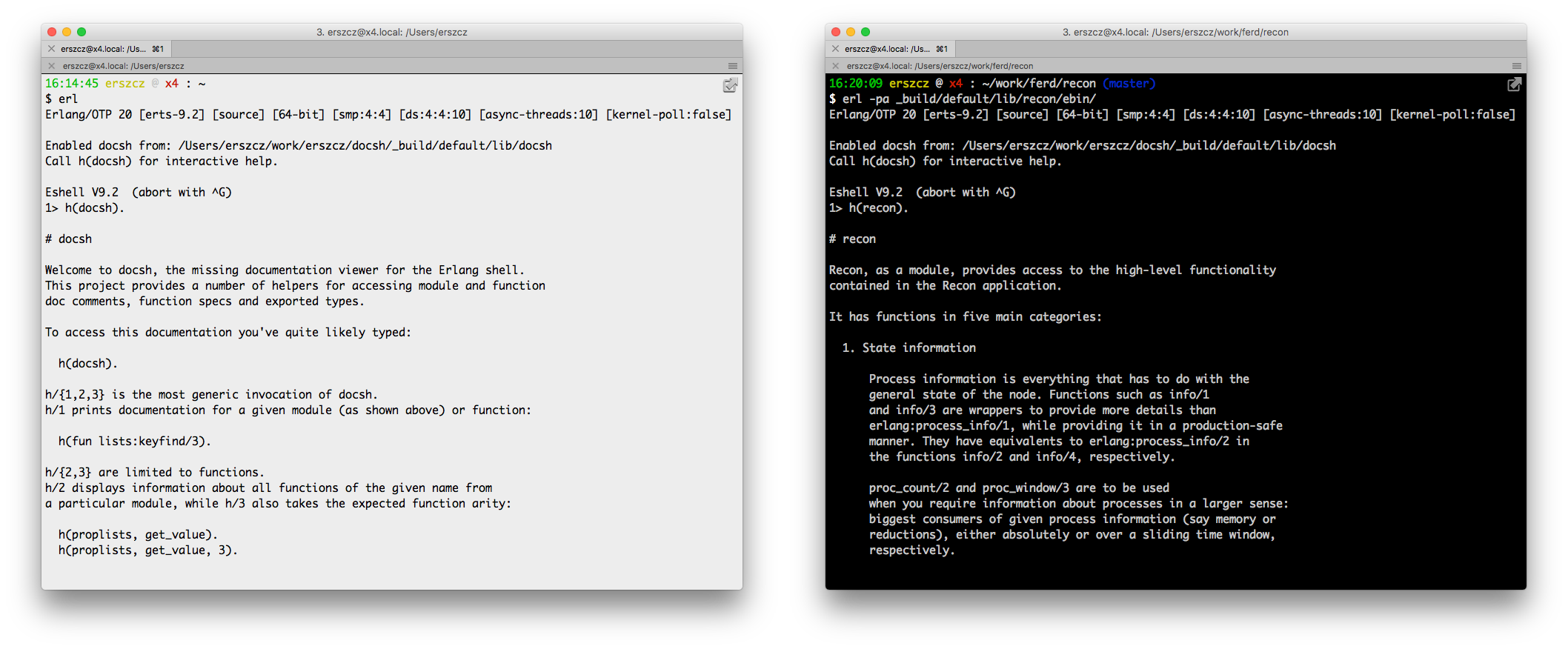# Docs in the Shell
[](https://travis-ci.org/erszcz/docsh)
[](https://hex.pm/packages/docsh)
Still can't write match specs from the top of your head?
Forgetting again and again `dbg` flags or the syntax of `recon` trace patterns?
Ever wished for access to documentation straight from `erl`
the way it's possible in languages like Python, Ruby or Elixir?
[](https://github.com/erszcz/docsh/blob/master/doc/light-dark-bg.png)
## Embed docs in your modules
Write them first in your `.erl` files.
Then add the following to your project's `rebar.config`:
```erlang
{plugins,
[
{rebar3_docsh, "0.6.1", {pkg, docsh}}
]}.
{provider_hooks,
[
{post, [{compile, {docsh, compile}}]}
]}.
```
## Extend `erl` with docs access
```
git clone https://github.com/erszcz/docsh
cd docsh
./install.sh
```
The script will ask if you're sure you want to create some
Erlang configuration files:
```
$ ./install.sh
Installing docsh
This install script will make docsh globally available in your
user environment.
It will install the following files:
/Users/erszcz/.erlang
/Users/erszcz/.erlang.d/user_default.erl
To know more about these files please refer to:
man erl - sections about 'The .erlang startup file'
and 'user_default and shell_default'
man shell_default - parts about user_default
Do you want to proceed? [y/N]
```
Even if you agree to install, but the target files exist,
it won't proceed - don't worry if you have customized your
Erlang environment already.
Once the installation is complete,
`erl` will greet you in a bit different way than you might be used to:
```erlang
$ erl
Erlang/OTP 19 [erts-8.2] [source] [64-bit] [smp:4:4] [async-threads:10] [kernel-poll:false]
Enabled docsh from: /Users/erszcz/work/erszcz/docsh
Eshell V8.2 (abort with ^G)
1>
```
## Access docs in `erl`
Let's see what docsh can give us for some OTP modules.
We call `h/2` to get the doc for `lists:keyfind` no matter the arity:
```
$ erl
Erlang/OTP 19 [erts-8.2] [source] [64-bit] [smp:8:8] [async-threads:10] [hipe] [kernel-poll:false]
Enabled docsh from: /Users/erszcz/work/erszcz/docsh/_build/default/lib/docsh
Call h(docsh) for interactive help.
Eshell V8.2 (abort with ^G)
1> h(proplists).
# proplists
Support functions for property lists.
Property lists are ordinary lists containing entries in the form
of either tuples, whose first elements are keys used for lookup and
insertion, or atoms, which work as shorthand for tuples {Atom,
true}. (Other terms are allowed in the lists, but are ignored
by this module.) If there is more than one entry in a list for a
certain key, the first occurrence normally overrides any later
(irrespective of the arity of the tuples).
Property lists are useful for representing inherited properties,
such as options passed to a function where a user may specify options
overriding the default settings, object properties, annotations,
etc.
% @type property() = atom() | tuple()
ok
2> t(proplists).
-type property() :: atom() | tuple().
-type proplist() :: [property()].
ok
3>
```
Let's try with Recon:
```
git clone https://github.com/ferd/recon
cd recon
./rebar compile
erl -pa ebin/
```
Once in the Erlang shell:
```erlang
Erlang/OTP 19 [erts-8.2] [source] [64-bit] [smp:8:8] [async-threads:10] [hipe] [kernel-poll:false]
Enabled docsh from: /Users/erszcz/work/erszcz/docsh/_build/default/lib/docsh
Call h(docsh) for interactive help.
Eshell V8.2 (abort with ^G)
> s(recon_trace, calls).
recon_trace:calls/2
-spec calls(tspec() | [tspec(), ...], max()) -> num_matches().
recon_trace:calls/3
-spec calls(tspec() | [tspec(), ...], max(), options()) -> num_matches().
ok
> h(recon_trace, calls, 2).
recon_trace:calls/2
-spec calls(tspec() | [tspec(), ...], max()) -> num_matches().
Equivalent to calls({Mod, Fun, Args}, Max, [])
See calls/3
ok
>
```
As you can see above, `s/2` gives us just the function specs.
Having read them, we want a more detailed description of `recon_trace:calls/2`,
so we ask for the doc and specify the arity with `h/3`.
Try it with your project!
[edoc:module-tags]: http://erlang.org/doc/apps/edoc/chapter.html#Module_tags
[gh:recon-docsh]: https://github.com/erszcz/recon
